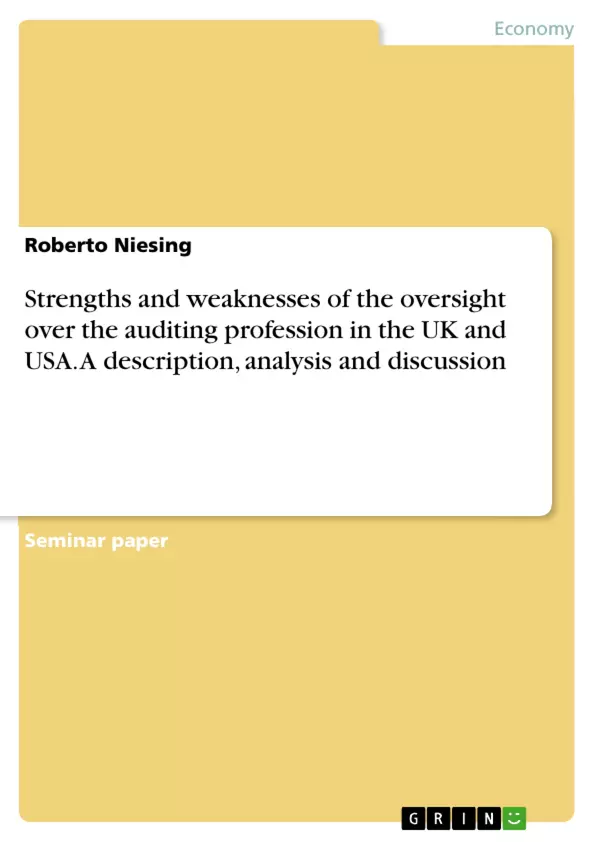The Assignment describes and analyses the strengths and weaknesses of the oversight over the auditing profession in the UK and USA. Also different important points were examined and critically discussed.
In the film ‘Enemy of the state’ (2007) the American government wants to pass a law which allows wide observation which would endanger privacy. To reach this goal, Senator Reynolds
even kills an opposing politician who had tried to avoid this act. At the end of the movie a simple question can be asked: “who controls the controller?”.
The same issue was relevant when Enron became spectacularly bankrupt. This big conglomerate was audited by the accountancy firm Arthur Andersen. Andersen’s company also offered Enron non-audit services like book-keeping and consulting. Through this lack of independence, the auditors were trapped in a big conflict of interest and could not do their work.
Since this huge disaster many changes in the oversight of auditing have taken place. Especially in the USA and the UK, control of auditing was reformed by the government. The following sections will provide detailed descriptions of the oversight systems in both countries. Afterwards a discussion and a critical analysis will outline the pros and cons for each regulation scheme and a consideration of the best way to point out the advantages and chances for oversight profession will be presented.
Inhaltsverzeichnis (Table of Contents)
- Introduction
- The oversight system in the UK
- The oversight system in the US
- Discussion
- Conclusion
- References
- Mappings
Zielsetzung und Themenschwerpunkte (Objectives and Key Themes)
This paper aims to provide a comprehensive analysis of the audit profession oversight systems in the UK and a European country of the author's choice. It compares and contrasts these systems with the Public Company Accounting Oversight Board (PCAOB) standards in the USA.
- The evolution of audit oversight systems in response to corporate scandals like Enron and WorldCom.
- The structure and responsibilities of regulatory bodies in the UK and the chosen European country.
- The impact of legislation such as the Sarbanes-Oxley Act (SOX) in the USA.
- The challenges and opportunities in promoting ethical standards and ensuring audit quality.
- A comparative analysis of the strengths and weaknesses of different oversight models.
Zusammenfassung der Kapitel (Chapter Summaries)
- Introduction: The introduction establishes the context by referencing the film "Enemy of the State" and the Enron scandal, highlighting the importance of independent audit oversight.
- The oversight system in the UK: This chapter outlines the reforms to the UK's audit oversight system following the Enron debacle, detailing the role of the Financial Reporting Council (FRC) and its subsidiary boards.
- The oversight system in the US: This chapter focuses on the implementation of the Sarbanes-Oxley Act (SOX) in the US, emphasizing the separation of audit and non-audit services and the establishment of the Public Company Accounting Oversight Board (PCAOB).
Schlüsselwörter (Keywords)
This paper explores the key concepts of audit oversight, corporate governance, ethical standards, independence, regulatory frameworks, and international accounting standards. It examines the role of regulatory bodies such as the Financial Reporting Council (FRC) in the UK, the Public Company Accounting Oversight Board (PCAOB) in the USA, and the chosen European country's equivalent. Furthermore, it delves into the impact of legislation like the Sarbanes-Oxley Act (SOX) and the implications of corporate scandals like Enron and WorldCom for audit oversight.
Frequently Asked Questions
What is the focus of this auditing oversight analysis?
The paper analyzes and compares the strengths and weaknesses of auditing oversight systems in the UK and the USA, specifically in the wake of major corporate scandals.
How did the Enron scandal change the auditing profession?
The Enron scandal revealed a massive conflict of interest where auditors provided non-audit services. This led to a separation of these services and stricter government oversight.
What is the Sarbanes-Oxley Act (SOX)?
SOX is a US federal law enacted in 2002 that set new or expanded requirements for all US public company boards, management, and public accounting firms, establishing the PCAOB.
What is the role of the PCAOB in the United States?
The Public Company Accounting Oversight Board (PCAOB) is a private-sector, nonprofit corporation created by SOX to oversee the auditors of public companies to protect investors.
Who regulates the auditing profession in the UK?
In the UK, the Financial Reporting Council (FRC) is the primary regulatory body responsible for overseeing the auditing profession and promoting high-quality corporate governance.
Why is auditor independence a central issue?
Without independence, auditors may face conflicts of interest, as seen with Arthur Andersen and Enron, which prevents them from providing an objective and fair assessment of a company's finances.
- Arbeit zitieren
- Roberto Niesing (Autor:in), 2007, Strengths and weaknesses of the oversight over the auditing profession in the UK and USA. A description, analysis and discussion, München, GRIN Verlag, https://www.grin.com/document/92854



